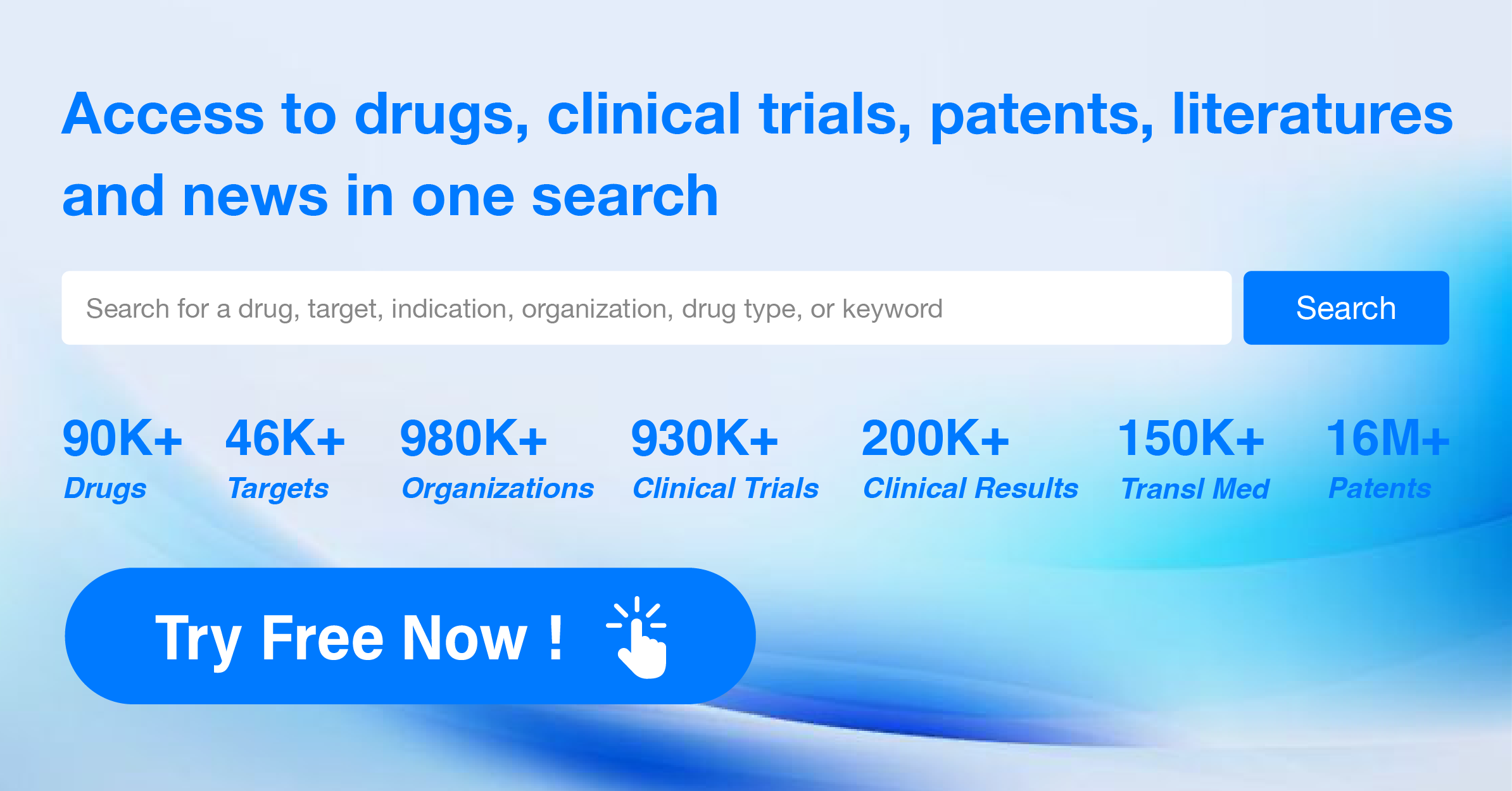Pharma Frontiers: Daily Digest of Global Pharmaceutical News – Jul 26
1.Takeda/Belief BioMed's Hemophilia B Gene Therapy, BBM-H901 Injection, Files for Market Approval in China
On July 24, Takeda together with Belief BioMed announced that the National Medical Products Administration (NMPA) has formally accepted the New Drug Application (NDA) for BBM-H901 injection for the treatment of Hemophilia B in adult patients. BBM-H901 injection is a recombinant adeno-associated virus (AAV) gene therapy drug, independently researched and developed by Belief BioMed, which introduces the human coagulation Factor IX gene into Hemophilia B patients via intravenous administration for continuous expression. This treatment aims to increase and maintain long-term coagulation factor levels to prevent bleeding in adult patients with Hemophilia B. In October 2023, Takeda China announced an exclusive commercialization agreement within the field of Hemophilia B with Belief BioMed. Both parties will combine their respective strengths and resources to accelerate the commercialization process of BBM-H901 injection. In the future, Takeda China will be responsible for the commercialization and promotional efforts of this product in mainland China, Hong Kong, and Macau. The submission is based on a multicenter, single-arm, open-label, single-dose registration clinical study (CTR20212816) designed to assess the safety and efficacy of a single intravenous infusion of BBM-H901 injection in Hemophilia B patients aged ≥18 years with endogenous coagulation factor IX (FⅨ) activity ≤2 IU/dL (≤2%). As of now, all subjects in the phase III confirmatory study stage have completed their 52-week visit post-administration. Hemophilia B is an inherited coagulation disorder characterized by a deficiency of coagulation factor IX (FIX), leading to repeated and spontaneous bleeding in joints, muscles, and soft tissues. Chronic and recurrent bleeding can also lead to joint deformities, muscle atrophy, or even death.
2.Over 80% of patients have an annual bleeding rate of nearly 0%! Pfizer's Hemophilia Gene Therapy Phase III Study Succeeds
On July 24th, Pfizer announced positive results from the Phase III AFFINE study (NCT04370054) of its gene therapy, giroctocogene fitelparvovec, in treating adult patients with moderate to severe hemophilia A. The AFFINE study is an open-label, multi-center, single-arm Phase III clinical trial designed to assess the efficacy and safety of a single intravenous infusion of giroctocogene fitelparvovec in adult males with moderate-to-severe hemophilia A. The results showed that the AFFINE study met its primary endpoint, with a total annualized bleeding rate (ABR) that was lower than that of conventional Factor VIII (FVIII) replacement therapy, from the 12th week after infusion for at least 15 months of follow-up. After a single administration of giroctocogene fitelparvovec, the patients’ ABR significantly decreased (1.24 vs 4.73 with a one-sided p-value of 0.0040). The study also met key secondary endpoints, showing advantages over conventional FVIII replacement therapy. 84% of participants maintained FVIII activity >5% after 15 months of receiving giroctocogene fitelparvovec (one-sided p-value=0.0086), with most participants achieving FVIII levels ≥15%; the mean ABR reduced from 4.08 before infusion to 0.07 after infusion, a 98.3% reduction, which was statistically significant (one-sided p-value<0.0001). Patients exhibited good tolerability to giroctocogene fitelparvovec. Fifteen patients (20%) reported severe adverse events, with ten patients (13.3%) reporting 13 treatment-related adverse events which were resolved after clinical intervention. Giroctocogene fitelparvovec is an innovative gene therapy, comprising an AAV6 vector (recombinant adeno-associated virus serotype 6) and a modified human FVIII gene with a B-domain deletion, enabling patients to produce FVIII on their own for an extended period.
3.New Small Molecule Lung Cancer Drug, Sutetinib Maleate, Proposed for Inclusion as a Breakthrough Therapy
On July 24, the website of the Center for Drug Evaluation (CDE) of the China National Medical Products Administration announced that the application for Sutetinib Maleate capsules, co-submitted by Jiangsu Suzhong Pharmaceutical (SZYY Group Pharmaceutical) and others, is proposed for inclusion as a breakthrough therapy. This application targets locally advanced or metastatic non-small cell lung cancer (limited to non-resistant rare EGFR mutations, including L861Q, G719X, and/or S768I). There are over two hundred types of EGFR gene mutations, categorized into common and rare mutations. 19DEL and L858R are well-known common mutations, with relatively good response to 1st/2nd/3rd generation tyrosine kinase inhibitors (TKIs). Beyond the common mutations, patients may also develop rare mutations like G719X, S768I, and L861Q, which constitute only 10%-15% of all EGFR gene mutations. A lack of clinical treatment options persists since these rare mutations are not uniformly sensitive to all EGFR-TKIs. According to public information, Sutetinib was developed by Suzhou Teligene (in cooperation with Suzhong Pharmaceutical in China) as a small molecule inhibitor targeting atypical EGFR mutations. It is primarily intended for treating locally advanced or metastatic non-small cell lung cancer carrying non-resistant atypical EGFR mutations (L861Q, G719X, S768I) or other non-resistant atypical EGFR mutations (E709A, E709K, R776H, G724S, G779F, etc.), or those who have developed resistance to a third-generation EGFR inhibitor. The intended breakthrough therapy designation for Sutetinib focuses on its indication for locally advanced or metastatic non-small cell lung cancer (limited to non-resistant rare EGFR mutations, including L861Q, G719X, and/or S768I). According to information disclosed in Suzhou Teligene's IPO prospectus, in a Phase 2a clinical trial for this indication of non-small cell lung cancer, patients treated daily with an 80 mg dose of Sutetinib achieved an approximate objective response rate (ORR) of 92.9%.
4.Biogen/Sage's Essential Tremor Drug SAGE-324 Fails Phase II Study
On July 24, Sage Therapeutics and Biogen jointly announced that their Phase II KINETIC 2 study of the GABAA receptor positive allosteric modulator SAGE-324 (BIIB124) for the treatment of essential tremor (ET) did not meet its primary endpoint. There was no statistically significant dose-response relationship in the change from baseline to day 91 in the ‘upper limb score’ of the primary endpoint, the Essential Tremor Rating Assessment Scale (TETRAS) Performance Subscale (PS). Furthermore, there was no statistically significant difference between any dose of SAGE-324 and the placebo in terms of the TETRAS-PS fourth item score or the TETRAS Activities of Daily Living (ADL) composite score. Given these results, Sage and Biogen will terminate the ongoing open-label safety study of SAGE-324 for treating ET and do not intend to further pursue clinical development of SAGE-324 for ET. The companies are currently evaluating next steps for other potential indications, if any.
Initially, SAGE-324 met the primary endpoint in the first Phase II KINETIC study treating essential tremor, but the effect was not deemed significant enough. The KINETIC study showed that patients receiving SAGE-324 experienced a 36% reduction in upper limb tremor amplitude from baseline levels, compared to a 21% reduction in those receiving a placebo. Hence, Sage planned to initiate another Phase II clinical trial, KINETIC 2, to determine whether to proceed to Phase III trials.
Over the past 50 years, innovations in pharmacological treatments for essential tremor have been scant, and many new drugs under development have faced numerous challenges. In March 2023, Praxis Precision Medicines’ T-type calcium channel blocker ulixacaltamide failed to meet the primary endpoint in the Phase IIb Essential1 study for treating essential tremor.
5.Cellectar's Radiopharmaceutical Iopofosine I-131 Reaches Primary Endpoint in Key Study
On July 23, Cellectar Biosciences announced positive results from the pivotal CLOVER WaM study for its novel radiopharmaceutical, iopofosine I-131, in treating patients with Waldenstrom’s Macroglobulinemia (WM). This study assessed the efficacy of iopofosine I-131 in WM patients who had previously received at least two therapies, including BTK inhibitors. Cellectar Biosciences plans to submit a New Drug Application in the fourth quarter of 2024 and seeks priority review.
The CLOVER-1 study (NCT02952508), an open-label, multicenter Phase II clinical trial, aimed to evaluate the therapeutic efficacy of iopofosine I-131 in relapsed/refractory (R/R) specific B-cell malignancies. The CLOVER WaM is an expanded cohort study within this trial for WM patients. According to the revised criteria from the 6th International Workshop on Waldenstrom's Macroglobulinemia, as of May 31, 2024, the major response rate (MRR) was 56.4% (95% CI, 0.42-0.67), surpassing the main endpoint of achieving an MRR of 20%. The study featured a median age of 70 (range 50-88 years) in the modified intent-to-treat (mITT) population (n=55), with a median of 4 prior lines of therapy (range 2-14). Approximately 27% of the patients had hard-to-treat conditions, including BTK inhibitors, CD20 monoclonal antibodies, and chemotherapy; 40% were tough to treat with combination therapies including BTK inhibitors and rituximab.
Secondary endpoints included an overall response rate (ORR) of 80%, observed similarly across subgroups such as MYD88 wild type (81%; n=16), P53 mutation (80%; n=5), and post-BTK inhibitor treatment (72%; n=39). Disease control rate (DCR) reached 98%, and the duration of response (DOR) also indicated clinical benefits from iopofosine I-131 therapy.
6.AbbVie's innovative ADC drug ABBV-706 files for clinical trials in China
On July 25th, the Center for Drug Evaluation (CDE) of China's National Medical Products Administration (NMPA) officially accepted the application for clinical trials of AbbVie's ABBV-706, a lyophilized powder for injection. Public records indicate that ABBV-706 is an antibody-drug conjugate (ADC) targeting SEZ6, with a topoisomerase 1 inhibitor (TOP1i) as the cytotoxic payload. It is currently undergoing Phase 1 clinical studies internationally. This marks the first time that this SEZ6-targeting ADC investigational product has applied for clinical trials in China. SEZ6, or seizure-related homolog 6, is a cell surface protein typically expressed specifically in neuroendocrine tumors, including small cell lung cancer (SCLC) and certain neuronal tissues, but minimally expressed in most normal tissues. ABBV-706 employs AbbVie's proprietary novel topoisomerase 1 inhibitor as its effective payload. Top1i, an anticancer agent, induces cell death by blocking DNA replication.
In May 2024, AbbVie presented the dose-escalation results of monotherapy in first-in-human studies with patients with advanced solid tumors at the American Society of Clinical Oncology (ASCO) Annual Meeting. The study recruited patients with recurrent/refractory SCLC, central nervous system (CNS) tumors, and neuroendocrine tumors (NENs). The data revealed that among 33 evaluable patients, the confirmed objective response rate (ORR) was 21%, with 40% in SCLC patients and 6% in NEN patients. The unconfirmed overall response rate was 45%, with SCLC patients at 73% and NEN patients at 22%. The clinical benefit rate was 91%. The study concluded that ABBV-706 demonstrated controllable safety and significant efficacy in patients with SCLC and NEN during the trials.
7.Fanen Biotechnology's Solid Tumor TAL-T Therapy IND Approved
Recently, according to the official website of the Center for Drug Evaluation (CDE) under the National Medical Products Administration, Fanen Biotechnology's "TAL-T Cell Injection" has been granted an implied permission for clinical trials. The indication is for advanced malignant solid tumors (acceptance number CXSL2400285). The approved IND for the cell injection is the world’s first TAL-T cell therapy, developed using Fanen Biotechnology's proprietary core technology, involving high-quality autologous anti-tumor T cells prepared from tumor-associated lymph nodes. This therapy successfully overcomes the low success rate of preparation and limited patient applicability issues faced by other autologous anti-tumor T cell therapies like TIL, thereby enabling its application in a majority of solid tumor cases. The TAL-T cell therapy boasts broad indications, no genetic modification, short preparation cycle, and impressive therapeutic effectiveness. An Investigator-Initiated Trial (IIT) is currently underway, showing excellent safety and significant efficacy.
Tumor-Associated Lymphnode T cell (TAL-T) therapy involves isolating anti-tumor T cells from tumor-associated lymph nodes and expanding them ex vivo to obtain a high quantity of superior-quality anti-tumor T cells, which are then reinfused into the patient for treatment. Tumor-associated lymph nodes are key immune organs in forming anti-tumor immune responses. Compared to tumor tissues, which have a hostile microenvironment, tumor-associated lymph nodes offer a friendly immune milieu, providing better stimulation signals and cytokines for immune cells. Consequently, the anti-tumor T cells from these lymph nodes exhibit enhanced functional status, robust proliferation capacity, memory phenotype, and under certain conditions, can be extensively expanded and effectively eliminate tumor cells.
8.Dren Bio Announces Strategic Collaboration with Novartis to Develop Bispecific Antibodies
On July 24th, Dren Bio announced a strategic collaboration with Novartis to develop bispecific antibodies using Dren Bio’s proprietary platform. According to the terms of the agreement, Dren Bio will receive an upfront payment of $150 million. Additionally, Dren Bio is eligible to receive up to $2.85 billion in potential additional payments upon achieving certain preclinical, clinical, regulatory, and commercial milestones. Founded in 2019, Dren Bio completed a $60 million Series A financing in October 2020 and a $65 million Series B financing in June 2022.
Dren Bio’s platform, targeting myeloid cell agonists and phagocytosis, is based on bispecific antibody technology. It induces potent elimination of pathogens, protein aggregates, and other pathogenic factors by binding selectively expressed phagocytic receptors on myeloid cells. The bispecific antibodies generated from this platform activate myeloid cells only in the presence of target antigens, thus enhancing therapeutic index and safety. The platform comprises multiple bispecific antibody products intended for the treatment of various diseases. Several products from Dren Bio’s pipeline have already entered clinical studies.
How to obtain the latest research advancements in the field of biopharmaceuticals?
In the Synapse database, you can keep abreast of the latest research and development advances in drugs, targets, indications, organizations, etc., anywhere and anytime, on a daily or weekly basis. Click on the image below to embark on a brand new journey of drug discovery!




